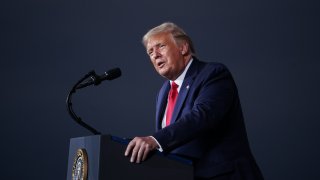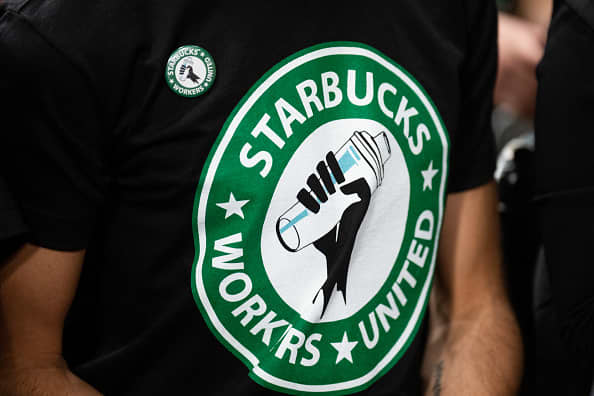
President Donald Trump is muddying up claims about clean air and dirty election ballots in the U.S., falsely taking credit for lower gasoline prices and misrepresenting Democratic rival Joe Biden’s stance on the suburbs.
A look at some of his claims Tuesday and how they match up with the facts:
ENERGY and ENVIRONMENT
TRUMP: “Instead of focusing on radical ideology, my administration is focused on delivering real results. And that’s what we have. Right now we have the cleanest air ever we’ve ever had in this country — let’s say over the last 40 years.” — remarks in Jupiter, Florida.
Get a weekly recap of the latest San Francisco Bay Area housing news. Sign up for NBC Bay Area’s Housing Deconstructed newsletter.
FACTS: He’s not responsible for all of the progress — far from it.
All six air pollution measurements monitored by the U.S. Environmental Protection Agency showed that in 2019 the U.S. air was the cleanest on record. However, the most important pollutant, tiny particles, was essentially about the same as 2016, only down 1%, according to Carnegie Mellon University environmental engineering professor Neil Donahue. The same figures also showed that air pollution rose in the first two years of the Trump administration before falling greatly in 2019.
Donahue and three other outside experts in air pollution said the president was wrongly taking credit for what years, even decades, of ever-increasing emissions restrictions caused.
U.S. & World
H. Christopher Frey, an engineering professor at North Carolina State University and former chief of the EPA’s air quality scientific advisory board, said that “current trends in air quality are for reasons irrespective of, or despite, policies of the Trump Administration.” Instead he and Donahue attributed it to a shift from use of dirtier coal — which the Trump administration has fought against — and newer, cleaner cars replacing older vehicles.
Frey said in an email that 20 million Americans still live in an area where tiny particle pollution is hurting their health, while the “Trump administration has ignored mainstream science in recently proposing to retain a standard that needs to be tightened. This means that the Trump administration is sacrificing public health in favor of anti-regulation ideology.”
___
TRUMP: “We’re showing that we can create jobs, safeguard the environment and keep energy prices low for America and low for our citizens. And you see that. You also see it when you pump the gas in your car and you’re sometimes paying a lot less than $2 lately. So we’re doing well.” — Florida remarks.
THE FACTS: Trump is wrongly taking credit for lower gas prices that were the byproduct of a pandemic that has killed more than 189,000 Americans.
Gasoline prices didn’t fall because of the Trump administration. They plunged because of the coronavirus forcing people to abandon their offices, schools, business trips and vacations.
As more people worked from home, they needed to fill up their cars less frequently. Airlines didn’t need to burn through as much fuel. Here’s the statement from the U.S. Energy Information Administration: “Reduced economic activity related to the COVID-19 pandemic has caused changes in energy demand and supply patterns in 2020.” World demand for oil has fallen by 8 million barrels a day, according to that agency’s estimates.
Underscoring the connection to the pandemic shutdown, U.S. gas prices were at their lowest in April when people were staying home most and is now up on average 33 cents a gallon, according to the EIA.
___
NOVEMBER ELECTION
TRUMP, retweetingan Associated Press analysis projecting the number of ballots that get rejected will soar this fall because of increased mail-in voting: “Rigged Election!” — tweet Tuesday.
THE FACTS: No, defective ballots do not equate to fraud. The overwhelming majority aren’t.
According to the Brennan Center for Justice, the vast majority of ballots are disqualified because they arrive late, a particular worry this year because of recent U.S. Postal Service delays and an expected surge in mail-in voting during the coronavirus pandemic.
Ballots also are deemed defective if there is a missing signature — common with newer voters unfamiliar with the process — or it doesn’t match what’s on file. In addition, some states require absentee voters to get a witness or notary to sign their ballots.
“None of those are fraud,” said Wendy Weiser, director of Brennan’s democracy program at NYU School of Law. When suspected cases are investigated for potential fraud, studies have borne out the main reason for defects is voter mistake.
The AP analysis published Monday found that rejections of absentee ballots could triple compared with 2016 in some battleground states, potentially tipping the election outcome.
It said voters “could be disenfranchised in key battleground states” and that nullified votes could be “even more pronounced in some urban areas where Democratic votes are concentrated and ballot rejection rates trended higher during this year’s primaries.” That’s far from an election “rigged” against Trump.
Ballots that get rejected in fact disproportionately impact voters of color, and recent lawsuits have successfully challenged some requirements on voter verification as posing health risks or disenfranchising voters.
“It is the No. 1 thing that keeps me up at night — the idea that voters will do everything they can to ensure their ballot is returned on time and the system will still fail them,” said Michigan Secretary of State Jocelyn Benson, a Democrat.
___
SUBURBS
TRUMP: “Sleepy Joe Biden has pledged to ABOLISH Suburban Communites as they currently exist by reinstating Obama’s radical AFFH Regulation. There goes Suburbia!” — tweet Tuesday.
THE FACTS: That’s a false portrayal of what Biden supports.
In 2015, during the Obama administration, a regulation took effect intended to ensure that communities confront racial segregation in housing.
The rule, put in place to strengthen enforcement of the landmark Fair Housing Act of 1968, for the first time required more than 1,200 jurisdictions receiving federal Housing and Urban Development block grants and housing aid to analyze their housing stock and come up with plans to combat patterns of segregation and discrimination.
The rule did not eliminate zoning for single-family homes in the suburbs as Trump and some of his supporters have asserted.
The Trump administration suspended full implementation of the rule in 2018 and withdrew a data tool designed to help cities analyze their housing, arguing it was too costly and burdensome.
Then last month Trump revoked the rule and tweeted to the “Suburban Housewives of America” that “Biden will destroy your neighborhood and your American Dream.” He made what fair housing advocates considered a racist argument playing on unfounded fears that low-income apartments would be forced into affluent neighborhoods.
Biden supports the 2015 regulation. But he does not support requiring municipalities to refrain from building single-family homes as a condition for getting money from HUD — the heart of the distorted claims by Trump.
AP Economy Writer Josh Boak and politics writer Tom Beaumont contributed to this report.



